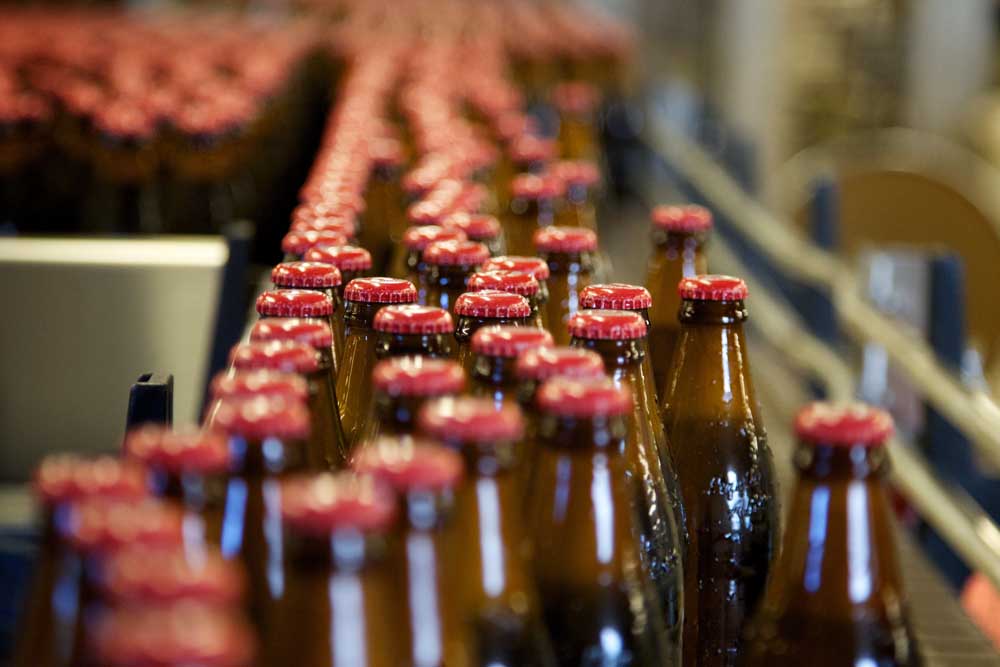Anheuser-Busch declines option to buy all of Craft Brew Alliance
Published 12:00 am Saturday, August 24, 2019

- In this 2013 file photo, bottles of Kona Longboard Lager beer slide down from the filler at Craft Brew Alliance Inc.'s packaging area at its North Portland brewery. (Benjamin Brink/The Oregonian via TNS, file)
Anheuser-Busch InBev declined an option to buy all of Widmer Brothers Brewing parent Craft Brew Alliance on Friday and shares of Portland-based CBA fell sharply as a result.
The decision ends an opportunity for the global brewing giant to gobble up the rest of one of Oregon’s last remaining pioneering breweries.
As the price for opting out, AB InBev must pay $20 million to the Portland-based brewing consortium and to continue providing it with the global brewing giant’s network of production facilities and distribution networks.
For the past three years, AB InBev, the largest brewery in the U.S. and maker of Budweiser and Bud Light brands, has owned slightly more than 31% of the CBA, and it had an Aug. 24 deadline to buy the rest of the company for a predetermined price of $24.50 per share — about $475 million.
That’s 89% above CBA’s closing share price of $12.96 Thursday, signaling that investors thought a deal was unlikely at the option price. CBA’s share price dropped 8.3% Friday morning, to $11.89.
“While disappointing, with this decision made, management can turn its attention to refining strategic alternatives to maximize shareholder value,” CBA Chief Executive Andy Thomas said in a written statement.
“We are optimistic that our healthy balance sheet, bolstered by the $20 million payment, and strategic investments in innovation and increased brand awareness will enable us to deliver long-term shareholder value,” Thomas said.
CBA said it will hold a conference call on Sept. 5 to discuss the company’s future.
In addition to Widmer, CBA owns Kona Brewing of Hawaii, Redhook Brewery of Seattle, Appalachian Mountain Brewery of North Carolina, Wynwood Brewing of Florida, Cisco Brewers of Massachusetts, Portland’s Square Mile Cider Co. and Omission Brewing. It also owns pH Experiment, an emerging maker of hard seltzers being developed in Portland.
“While we are not making an offer to purchase the remaining shares of CBA, our existing commercial partnership with CBA continues to be a key complement to our industry-leading craft portfolio and we look forward to working together for many years to come,” said Marcelo “Mika” Michaelis, president of Anheuser-Busch’s Brewers Collective.
CBA produced more than 719,000 barrels in 2018, according to regulatory filings, making it the 12th-largest brewer in the U.S. It reported $206.2 million in revenue last year, roughly flat with 2017, and profits of $4.1 million.
Sales for the CBA, which now includes eight breweries and cideries, have remained relatively steady over the past decade, but Widmer is no longer the group’s dominant brand, handing that crown over to Kona.
Kona’s Longboard Island Lager has helped drive sales of the Hawaiian brand above 450,000 barrels last year. That success has prompted the CBA to begin construction on a $20 million, 100-barrel brewery on the Big Island of Hawaii.
Meanwhile, Widmer’s sales have seen a steady drop in the past 10 years, going from nearly 300,000 barrels in 2010 to about 100,000 in 2018, a year that saw a 20% drop.
Those numbers drove a change in strategy at the CBA, which, according to its 2018 Securities and Exchange Commission filings, has begun promoting Kona as a national and global brand and focusing the other breweries on their own regions. For Widmer and Redhook, that means strengthening their positions within the Northwest.
Despite the declines, Widmer’s flagship Hefe remains the best-selling, most-widely recognizable craft beer in Oregon, leading the way to keep Widmer among the 50 highest-selling breweries in the nation.
Since selling a minority stake to Anheuser-Busch in 2013, the CBA has no longer been considered a craft brewery by the Brewers Association, the industry trade group.
Widmer began in 1984, when the homebrewing brothers quit their jobs and turned passion into career, scrounging together a brewing line from old dairy and junkyard equipment.
Kurt and Rob Widmer were among the group of pioneers — including the McMenamin brothers; Dick and Nancy Ponzi, founders of BridgePort Brewing; and Art Larrance, Fred Bowman, and Jim Goodwin, founders of Portland Brewing — who lobbied the Oregon Legislature in 1985 to pass the brewpub bill, which allowed brewery owners to sell their own beer on-premise.






